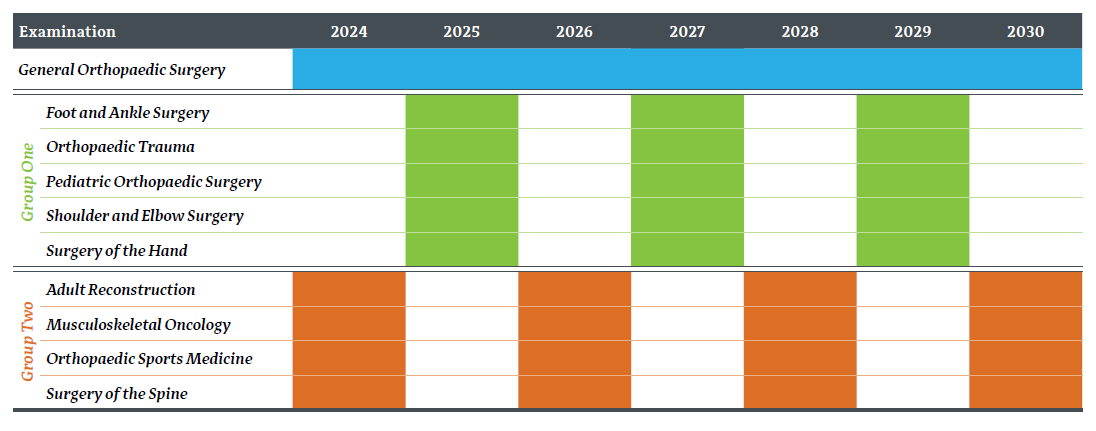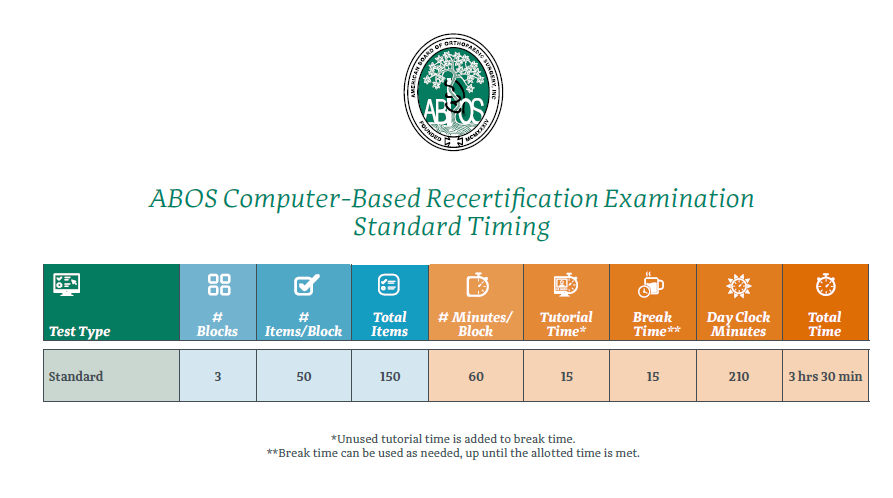Examination Options (MOC Part III)
Computer Examinations
Oral Examination
Web-Based Longitudinal Assessment (ABOS WLA) Pathway
Computer Examinations
General Orthopaedic Surgery Examination
This examination is a 150 question, multiple choice examination. Three hours of writing time is allowed to complete the examination. The questions cover general, clinical material that all orthopaedic surgeons should know, regardless of their area of expertise. The examination is given at Pearson Vue Test Centers and candidates may pick any time during the examination period that the sites are operational and have availability. The examination blueprint can be reviewed by clicking here.
Practice-Profiled Examinations

Practice-Profiled Recertification Examinations are offered in Adult Reconstruction, Foot/Ankle Surgery, Musculoskeletal Oncology, Orthopaedic Trauma, Pediatric Orthopaedic Surgery, Shoulder/Elbow Surgery, and Surgery of the Spine in alternating years according to the schedule above. Each of these examinations consists of 150 multiple choice questions in the chosen subspecialty area. There are no general orthopaedic questions on these Practice-Profiled Examinations. The examinations are given at Pearson Vue Test Centers and candidates may pick any time during the examination period that the sites are operational and have availability. The examination blueprints can be reviewed by clicking here.
Practice-Profiled Examinations are also available in Orthopaedic Sports Medicine and Surgery of the Hand, even for those Diplomates who do not have those subspecialty certifications but who wish to be examined in these practice-profiled areas. These two recertification examinations consist of 150 questions in the practice areas and do not include general orthopaedic questions. Diplomates who do not hold a Subspecialty Certificate cannot earn it by taking this test. To obtain Subspecialty Certification in either Orthopaedic Sports Medicine or Surgery of the Hand, a Diplomate must have completed an ACGME-accredited fellowship in one of those two areas and go through the application process. Following that, those Diplomates must take a Subspecialty Examination.
Combined Computer Examinations
For those Diplomates who hold a Subspecialty Certificate, they can be recertified for both their General and Subspecialty Certificates by taking one examination, either in Surgery of the Hand or Orthopaedic Sports Medicine. There are no general orthopaedic questions on this examination. Diplomates should take the examination based on when their General Certificate expires.
Examinees are provided with 15 total minutes of break time which can be used between any examination sections. The tutorial can be completed at home prior to the examination resulting in extra break time. Candidates WILL NOT be penalized for any break taken outside of the normal scheduled breaks EXCEPT that unscheduled breaks will reduce the time a Candidate has on his/her examination. The testing center staff will take note of unscheduled breaks for security reasons.
Diplomates can take an ABOS Computer-Based Recertification Examination in years 5-10. They do not need to submit a Professional Standing Update, Case List, or meet the CME/SAE requirements to take an ABOS Computer-Based Recertification Examination.
To learn how written examinations are developed, click here.
Oral Examinations
The practice-based Oral Examination for Recertification consists of an examination based on the candidate’s practice and is given every July. The candidate must submit a Professional Standing Update and Case List to the ABOS in years 7, 8, or 9 prior to being approved to sit for an Oral Examination. Case selectors will choose 12 cases for the candidate to present at the examination and all pertinent materials for those cases must be presented. The examination is divided into four 30-minute periods with two examiners in each period. There are breaks of 5 minutes each between each period. Examiners ask questions pertinent to the cases presented and pertinent to the candidate’s case lists. Specific skills that are evaluated are data gathering, diagnosis and interpretive skills, treatment plan, technical skill, outcomes, and applied knowledge. You can also view the scoring rubric. For Diplomates who hold Subspecialty Certification in either Orthopaedic Sports Medicine or Surgery of the Hand, there is a Combined Oral Examination Option that allows Diplomates the opportunity to renew both their General Orthopaedic Surgery Certification and their Subspecialty Certification with one examination.
